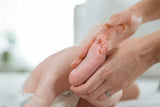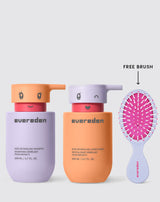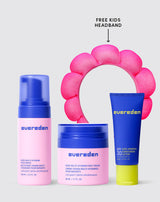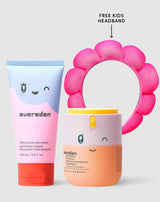Written by Dr. Joyce Teng, Head of Stanford University’s Pediatric Dermatology Department & Chief Scientific Officer at Evereden
What we apply on our skin is just as important as what we ingest in our bodies. If you remember from your high school biology class, the skin is our largest protective and defense organ and plays an essential role in keeping us healthy. Clean children’s skincare products are a necessity, as the skin expands rapidly from birth through the toddler years, meaning that all-important protective skin barrier is constantly playing catch-up until a child reaches the age of four. And much like your child’s brain, his or her skin is like a sponge in that its highly absorbent; as a result, it’s more likely to have adverse reactions when exposed to sensitizing ingredients such as harsh cleansers, preservatives and fragrances.
As Chief Scientific Officer at Evereden, I ensure the ingredients in all of our products are not only safe and effective for families but offer real research-backed and scientifically-proven value for the skin. And being a mom of three kids as well as a pediatric dermatologist and clinical researcher specializing in inflammatory skin diseases and atopic dermatitis, I consider myself the ultimate critic, which is why I joined Evereden. Here are some of my tips for fellow parents:

1. Moisturize your child’s skin at least once or twice a day (and ideally after every diaper change for babies) – early moisturization in infants can help prevent eczema and other allergy symptoms by as much as 50%.
Baby skin looks perfect, but it actually doesn’t fully develop until around age 2. Like the delicate skin under an adult’s eye, baby skin is thin and ultra-sensitive. The skin is the first line of defense and also your child’s largest protective organ. When it gets dry, skin’s protective barrier function diminishes, thereby allowing many allergens to enter your child’s body to activate his/her immune system.
Recent studies have shown that if we pay attention to skin barrier protection in infants – as early as 2-3 weeks of age – it can help to reduce risk of eczema as much as 50%, even in high-risk families prone to eczema.
Therefore, early moisturization and the use of hypoallergenic products keep infants’ skin healthy in the short and long term. Since eczema is often the first sign of “atopic march”, meaning children may develop asthma, allergic rhinitis, conjunctivitis and food allergy later in life. Reducing the risk of eczema may have additional health benefits beyond the skin. However, it’s never too late to start caring for your child’s skin no matter how old your babies are!
Just like you’d start and end your day with brushing your teeth, it is important to include skin care into your child’s daily routine. After cleansing with Baby Shampoo & Body Wash in lukewarm water, follow immediately with Soothing Baby Massage Oil (which happens to just have only 6 types of cold-pressed ingredients, and is comprised of 50% sunflower seed oil) on damp skin while the pores are still open; and finally seal in moisture by generously applying a layer of Baby Moisturizing Lotion, especially in the wintertime.

2. The simpler the ingredients, the better. And look out for natural ingredients with actual benefits to skin, such as Sunflower Seed Oil.
With various brands out there touting ‘natural’ and ‘organic,’ it can be overwhelming as a parent to choose the right products for your children. For daily usage I usually recommend skincare products that are relatively simple – as a general rule, the fewer chemical ingredients in skin care products the safer it is.
At Evereden, the team works hard to ensure that the natural ingredients put into the products are proven to have positive benefits for skin. Sunflower seed oil is one of my favorite ingredients which is included in all of our baby skincare products because it is one of the most studied ingredients in skincare, with lots of medical literature demonstrating its benefit in enhancing the skin’s barrier protection. Because it does not cause any sensitivity or irritation for infant skin, it’s also one of the most economical and beneficial skin care products recommended by the World Health Organization. The Bill and Melinda Gates Foundation has even funded the use of Sunflower Seed Oil to reduce serious infections in preterm babies in developing countries and improve their chances of survival.
Coconut oil, which is in many Evereden products, is another well studied skin care ingredient. There is recent literature that indicates that it can be quite helpful for the skin barrier as well. Grapeseed and avocado oil are also both common ingredients in our products because they are hypoallergenic.
At Evereden we have what we call our ‘never-ever list,’ which includes a list of 1,400+ harmful ingredients that we pledge to never use in any of our products. Cocamidopropyl Betaine, for instance, is one of them - a preservative that is frequently used in baby products such as wet wipes, moisturizers and hand lotions. We know that this is one of the common ingredients that kids can be sensitized to (and it was also named ‘allergen of the year’ a few years back).

3. Use a physical or mineral sunscreen daily…yes, even when it’s cloudy and in the winter.
Daily sunscreen usage for children 6 months old and older is key to skin health, even in the winter, as children skin are susceptible to injury by UVA and UVB rays year-round. Ultraviolet exposure cause DNA breakage in the cell even when there is no visible sunburn. Unprotected exposure to strong UV light can lead to color and texture change of the skin as well as risk of skin cancer.
When you use sun protection, you want to make sure you’re not swapping one evil for another. Make sure to look out for physical or mineral sunscreens using Zinc Oxide or Titanium Dioxide, as chemical sunscreens contain skin sensitizers and endocrine disruptors like Oxybenzone, Octinoxate, Octisalate and Homosalate. Some of these chemical sunscreen ingredients are currently banned in certain states such as Hawaii because of concerns about possible toxicity to the coral reefs.
Sunscreens containing mostly Zinc Oxide and Titanium Dioxide are considered mineral-based physical sunscreens. Some hybrid formulas include mineral based ingredients in combination with chemical blockers, such as Oxybenzone, Octinoxate and Avobenzone. These are often labeled as “mineral-based” or “zinc oxide” sunscreen. While it is not inaccurate to say that it is mineral-based, the label is misleading and certainly confusing to consumers to say the least! I therefore recommend parents to read all of the ingredients in the products they use. The Premium Mineral Sunscreen SPF 30 is a great daily sunscreen that I love to throw in my bag for a mid-application during my youngest’s outdoor swimming lessons.

Bonus tips for moms with babies:
Apply a zinc-oxide diaper rash cream preventatively after every diaper change. Diaper rashes occur because this specific, ultrasensitive area of baby is in a moisture-filled environment that is exposed to chemicals day in and day out. A good barrier cream can really stay on the skin to prevent contact exposure as well as to reduce inflammation. We chose to formulate our Soothing Diaper Rash Cream with zinc oxide because the texture is a little sticky, so it stays on the skin very well, and because it is also a natural anti-inflammatory ingredient.
Skip the daily bath - bathing an infant every single night is not necessary for their delicate skin. And despite images from the commercials you grew up with, filling that bath with heavily-fragranced bubbles often irritate baby’s fragile, developing skin barrier. In general, daily bathing is not necessary for young children and can dry out their skin sometimes. However, if your child really needs a good clean up after a serious “blow out”, it is quite alright as long as you use lukewarm water and keep bath time short.







